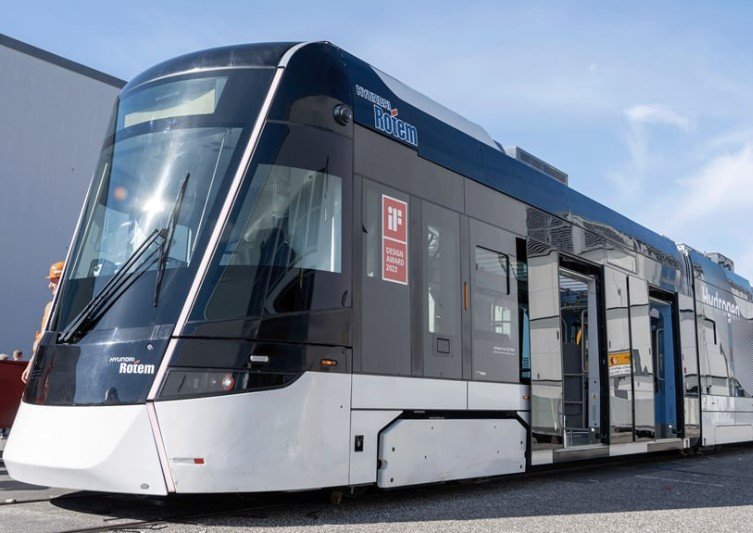Korea based railway giant Hyundai Rotem is stepping up efforts to win a major contract for hydrogen powered trams in Egypt. The company showcased its advanced technology at a key transport event in Cairo on November 10, 2025, aiming to lead in the country’s push for green urban mobility in its new administrative capital.
This move comes as Egypt ramps up infrastructure projects to support sustainable growth. Hyundai Rotem officials highlighted their full hydrogen ecosystem, from production to operation, positioning the firm as a strong contender for upcoming bids.
Showcase at TransMEA 2025 Draws Attention
Hyundai Rotem kicked off its promotion at the Smart Transport, Infrastructure, Logistics and Traffic for the Middle East and Africa event, known as TransMEA 2025. The expo, held in Cairo from Sunday to Tuesday, brought together industry leaders to discuss future transport solutions.

At their booth, the company displayed a model of its hydrogen electric tram, already set for commercialization in Korea. Visitors learned about the system’s eco friendly features, including zero emission operation that relies on hydrogen fuel cells.
This event marks a strategic step for Hyundai Rotem to gain an edge before official tenders begin. Company representatives engaged with Egyptian officials and potential partners, emphasizing how their technology aligns with local needs.
Egypt’s transport minister attended the opening, underscoring the nation’s focus on smart and green infrastructure. The expo featured discussions on integrating hydrogen solutions into urban planning, with Hyundai Rotem’s presentation standing out for its comprehensive approach.
Hydrogen Tram Technology Explained
The hydrogen tram from Hyundai Rotem uses fuel cells to generate electricity, powering the vehicle without harmful emissions. This setup promises cleaner air in crowded cities, a big plus for Egypt’s expanding urban areas.
Unlike traditional electric trams that rely on overhead wires, this model runs on hydrogen stored onboard. It can travel long distances on a single refill, making it ideal for new developments like the administrative capital.
Hyundai Rotem collaborates with its parent group to build the entire hydrogen chain. This includes producing hydrogen from biogas, a renewable source that reduces reliance on fossil fuels.
Experts note that such trams could cut operational costs over time. They require less maintenance than diesel alternatives and support global goals for carbon neutrality.
Egypt’s New Administrative Capital Takes Shape
Egypt is building a massive new city east of Cairo to ease overcrowding in the capital. Spanning 700 square kilometers, it aims to house over six million people and become a hub for government and business.
The project includes modern transport systems to connect residents efficiently. A hydrogen tram network fits perfectly into plans for sustainable mobility, reducing pollution and traffic congestion.
Construction began in 2015, with phases rolling out through 2025 and beyond. The city already features new roads, buildings, and utilities, but advanced rail options like hydrogen trams are key to its success.
Officials expect the tram system to link key areas, boosting economic activity. This aligns with Egypt’s broader vision for green energy, including solar and wind projects in the region.
Recent updates show progress in infrastructure, with international firms like Hyundai Rotem eyeing opportunities. The new capital could set a model for other African nations pursuing eco friendly urban growth.
Timeline of Hyundai Rotem’s Egypt Projects
Hyundai Rotem has built a solid track record in Egypt over the years. Here is a quick look at major milestones:
| Year | Project | Details |
|---|---|---|
| 2012 | Cairo Metro Line 1 | Supplied 180 wagons for urban rail expansion. |
| 2015-2020 | Cairo Metro Lines 2 and 3 | Delivered 624 train cars, enhancing daily commuting. |
| 2022 | Alexandria Trams | Provided modern trams for the coastal city’s network. |
| 2022 | Hydrogen Tram MoU | Signed agreement for green tram in new capital with local partners. |
| 2025 | TransMEA Promotion | Showcased hydrogen tech for upcoming bids. |
This history shows growing trust between Hyundai Rotem and Egyptian authorities. Local production deals have also transferred technology, creating jobs and skills in the region.
Past Deals and Future Opportunities
Hyundai Rotem first entered Egypt with a metro wagon contract in 2012. Since then, it has supplied hundreds of train cars for Cairo’s busy lines, improving reliability for millions of riders.
In 2022, the company formed a consortium with local and French firms to explore hydrogen trams for the new capital. This memorandum of understanding laid groundwork for larger projects.
Looking ahead, Egypt plans more rail upgrades, including high speed lines and eco friendly options. Hyundai Rotem aims to leverage its experience to secure these deals.
The firm is also expanding in Africa, viewing Egypt as a gateway. Success here could open doors to similar projects in neighboring countries.
Broader Impact on Green Transport
Hydrogen trams represent a shift toward sustainable public transport worldwide. In Egypt, they could reduce urban pollution, aligning with global climate goals discussed at events like COP27.
This technology supports job creation in manufacturing and maintenance. It also encourages investment in hydrogen infrastructure, from refueling stations to production plants.
Challenges remain, such as high initial costs and building supply chains. However, experts predict falling prices as adoption grows.
Other nations, like Korea and parts of Europe, are testing similar systems. Egypt’s project could inspire Africa wide initiatives for cleaner cities.
Strategic Moves in a Growing Market
As Egypt marks 30 years of diplomatic ties with Korea, business links strengthen. Hyundai Rotem’s push reflects broader economic cooperation in transport and energy.
The company’s official stated that their optimized hydrogen solutions are tailored for Egypt’s needs. This could lead to a contract award in the coming months.
Industry watchers see this as part of a trend where Asian firms bring cutting edge tech to African markets. It promises mutual benefits, from technology transfer to environmental gains.
Share your thoughts on hydrogen powered transport in the comments below. If this story interests you, pass it along to friends who follow green tech news.
